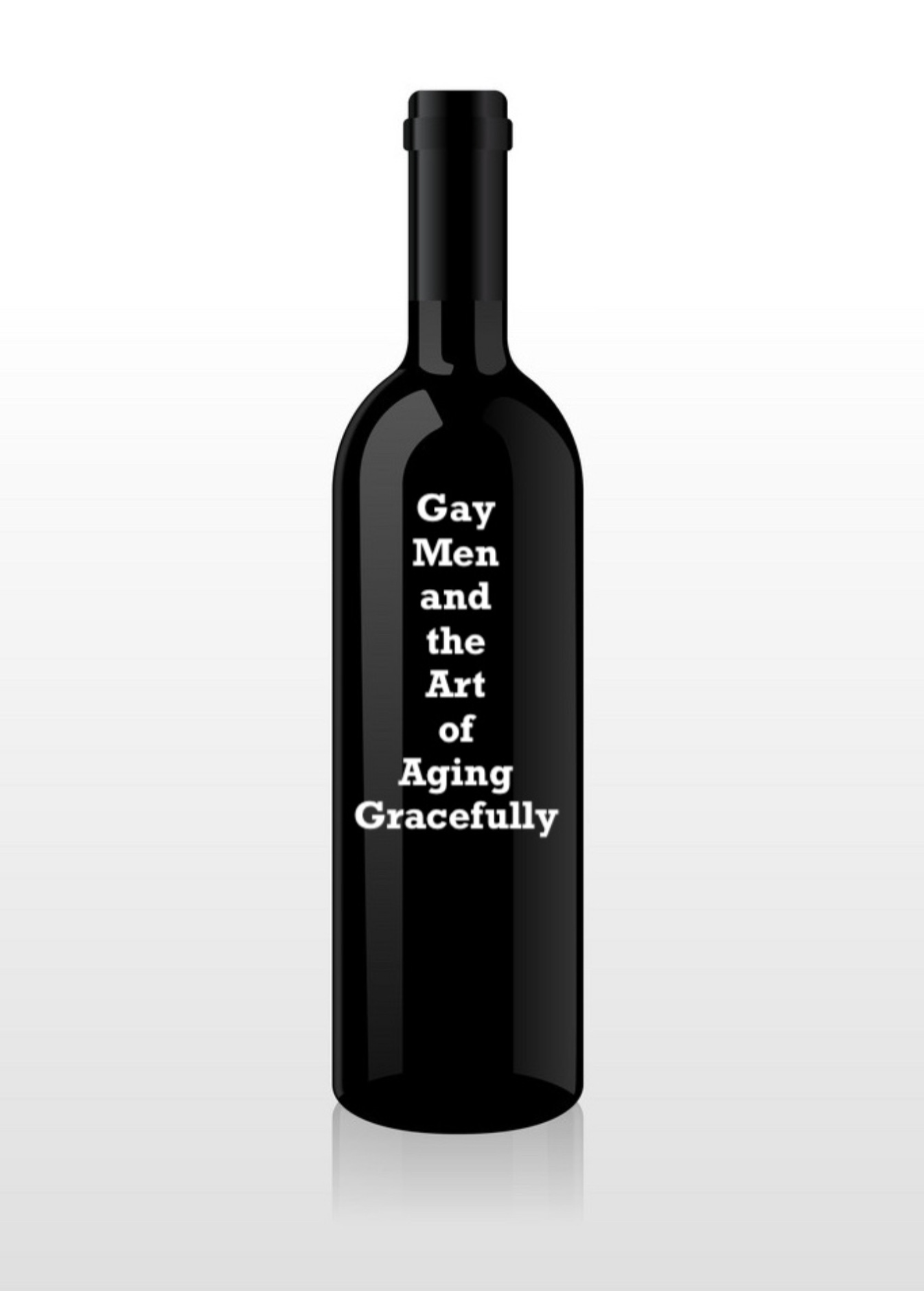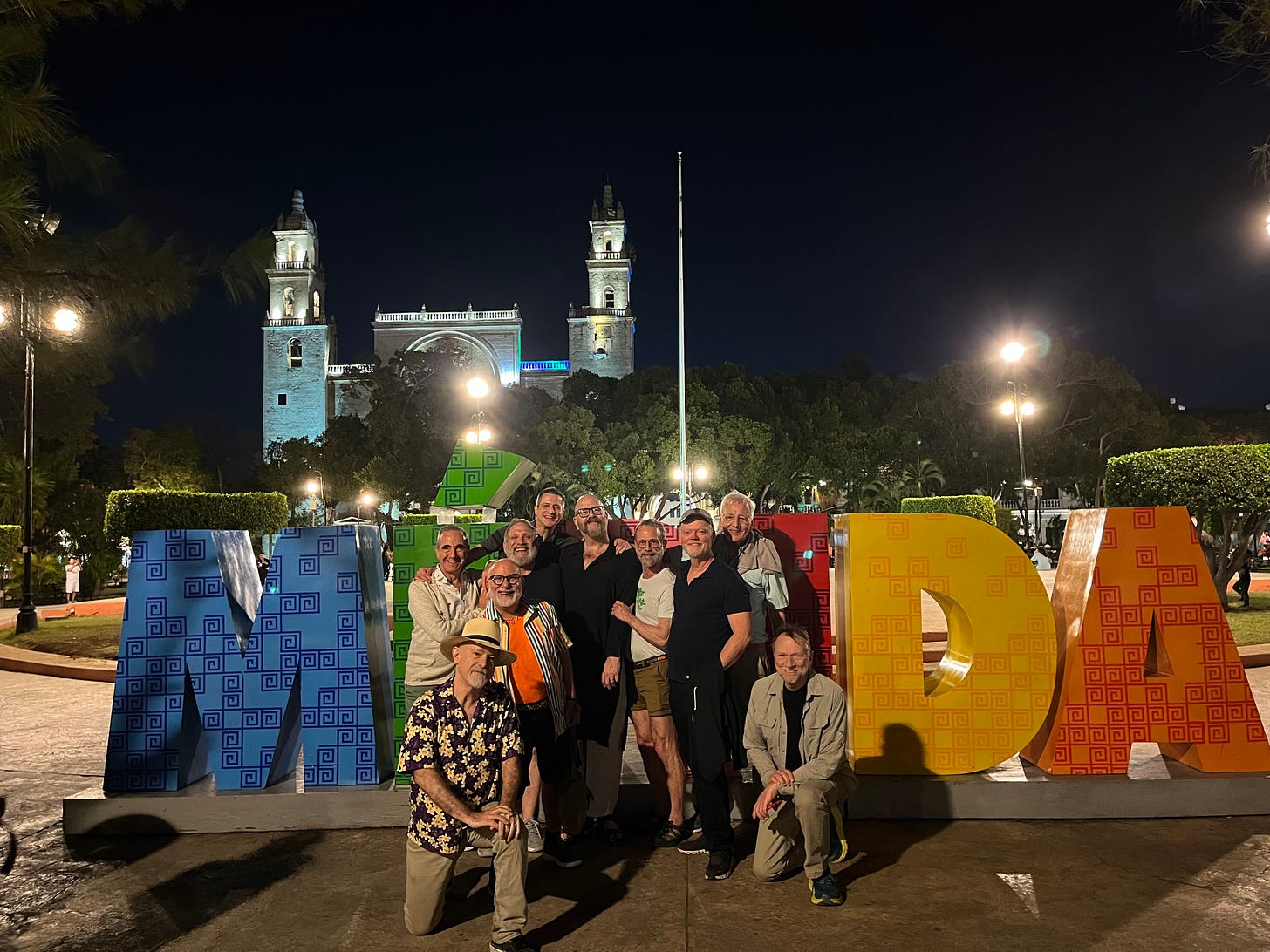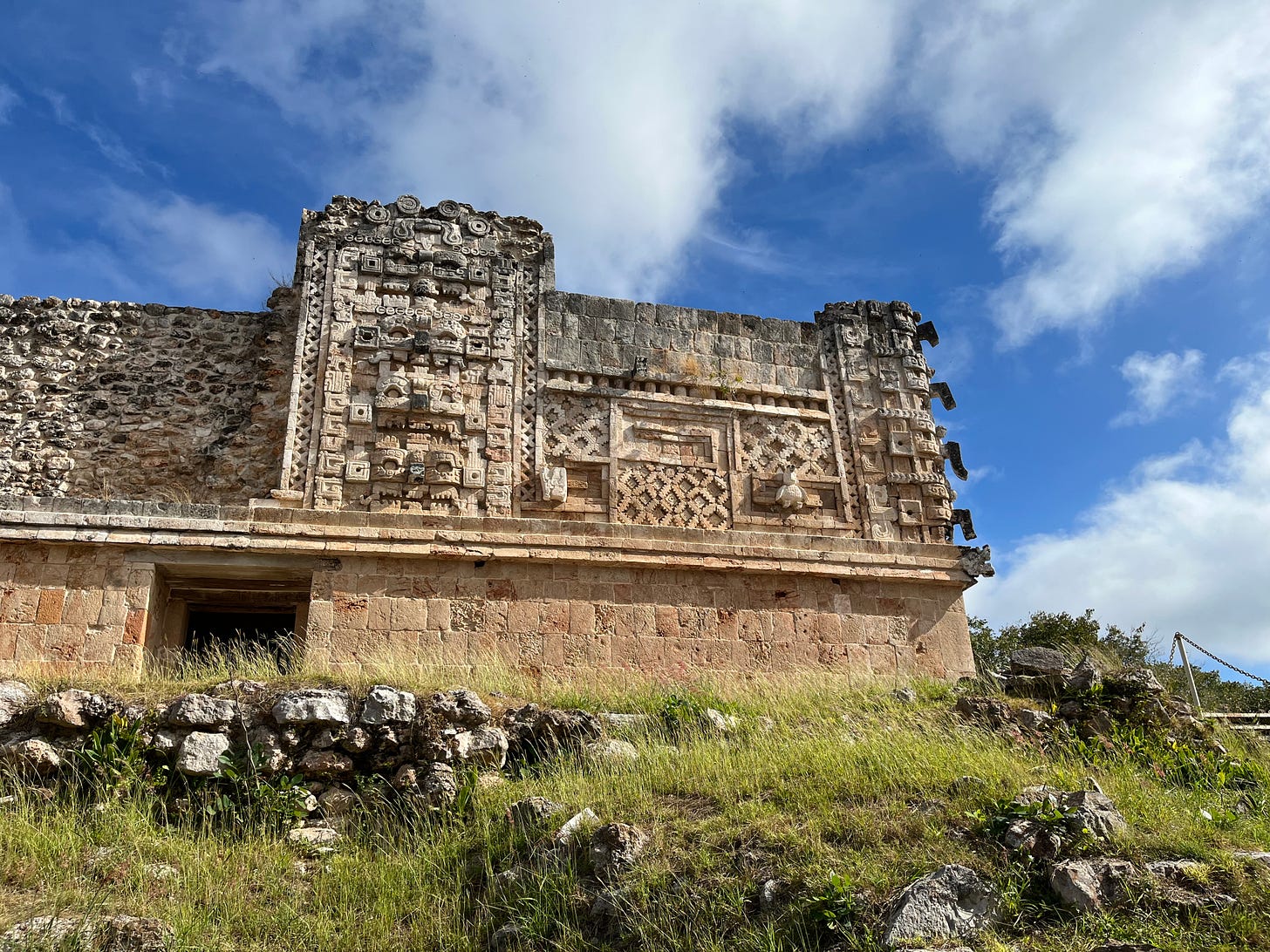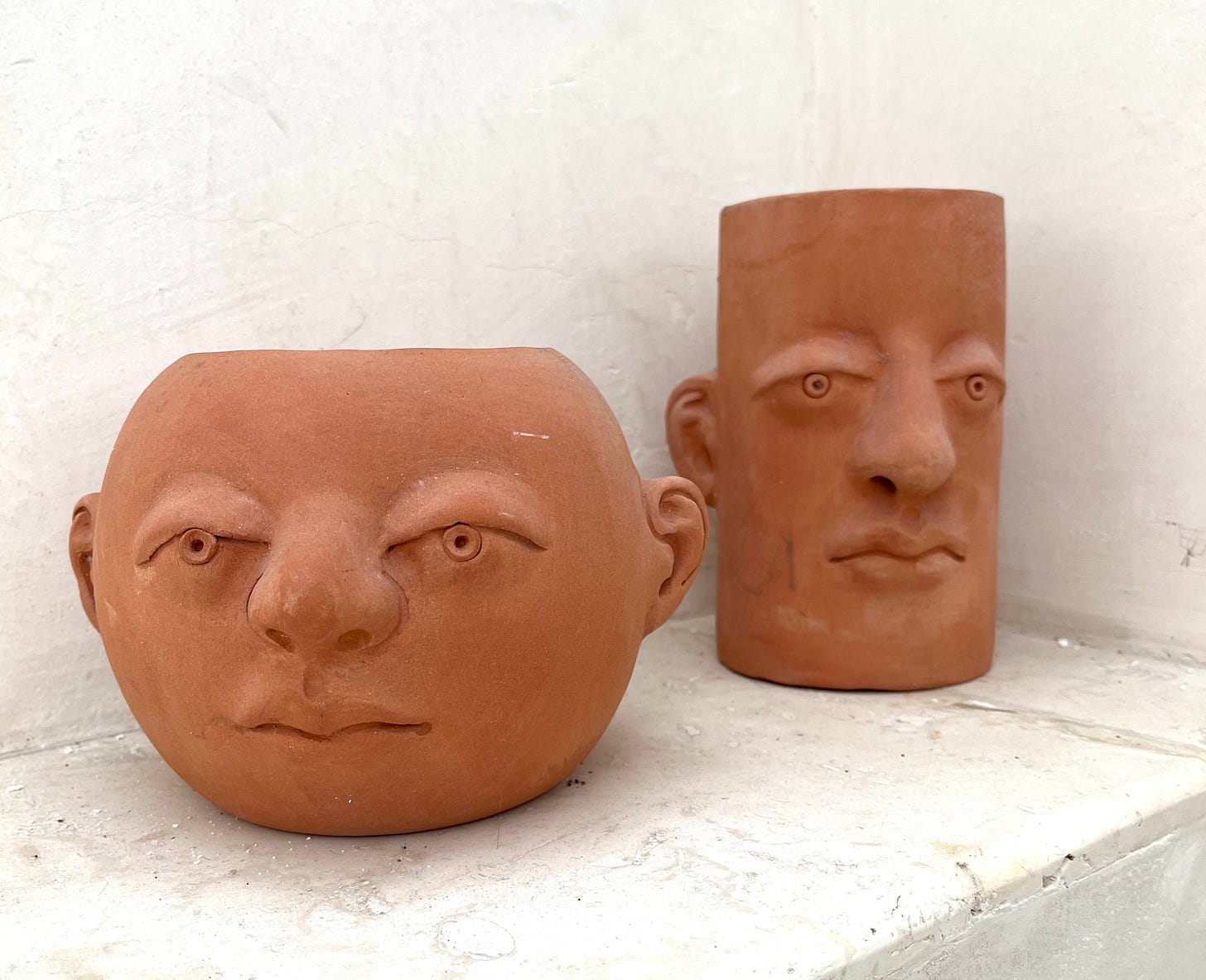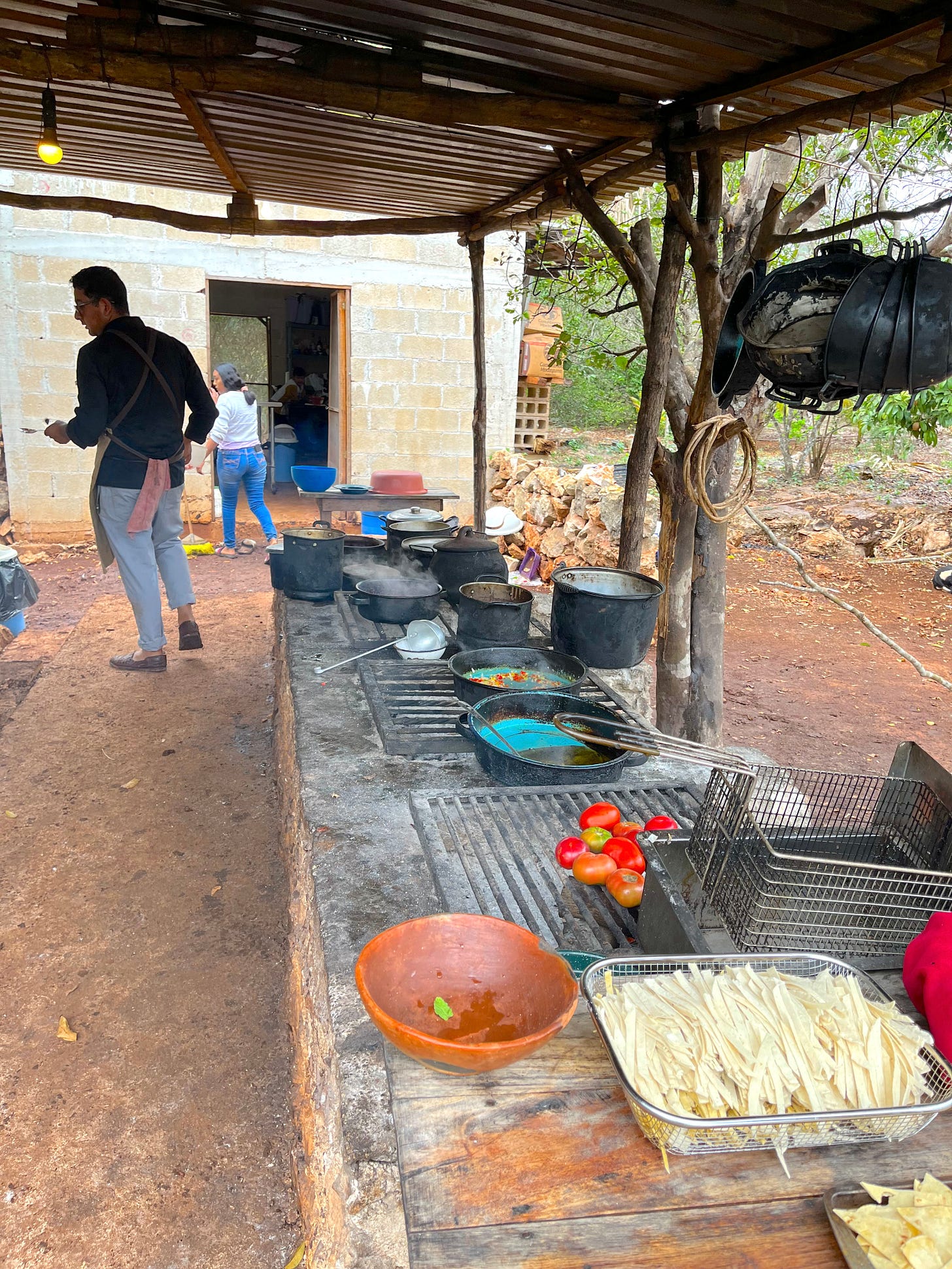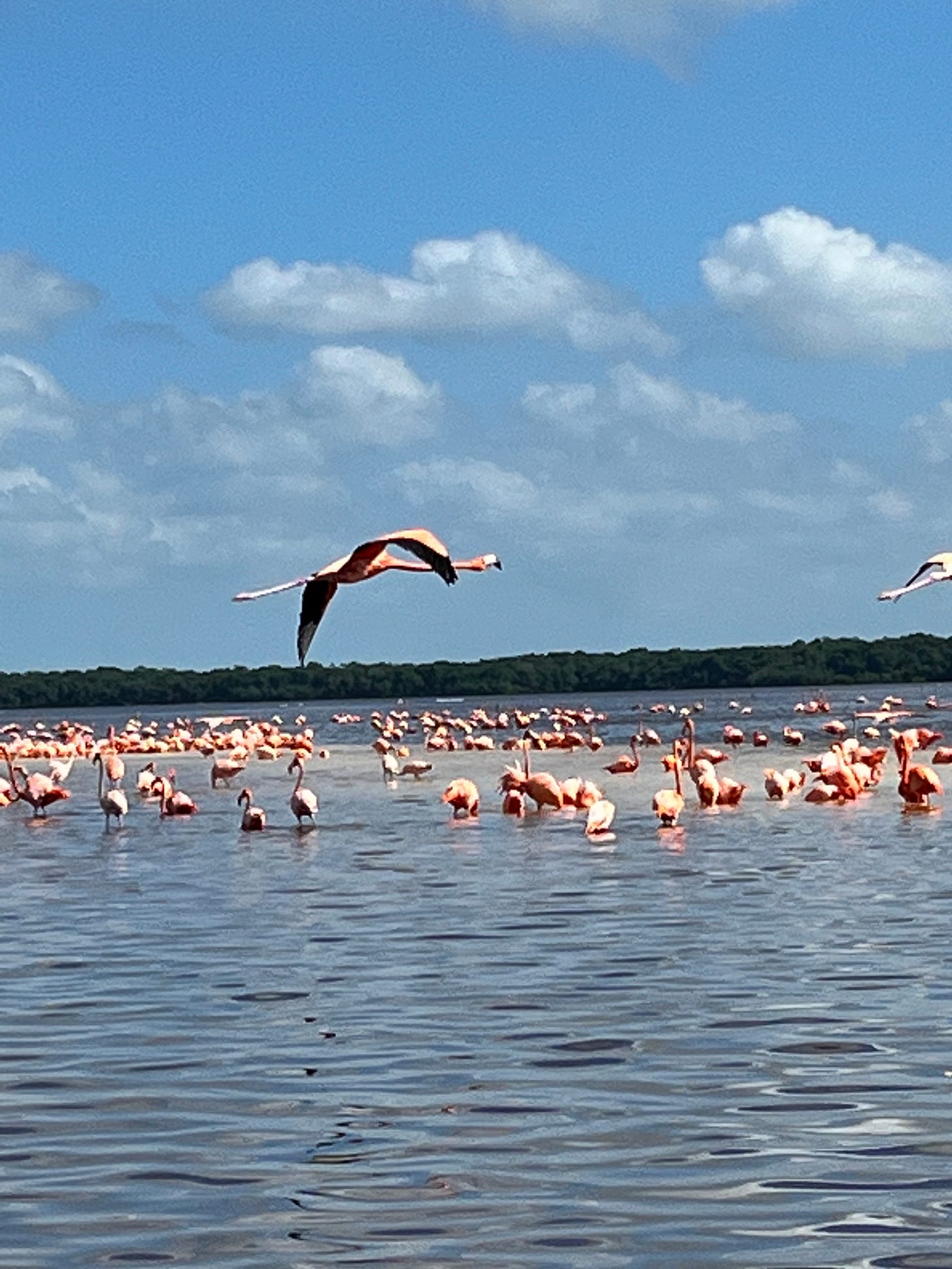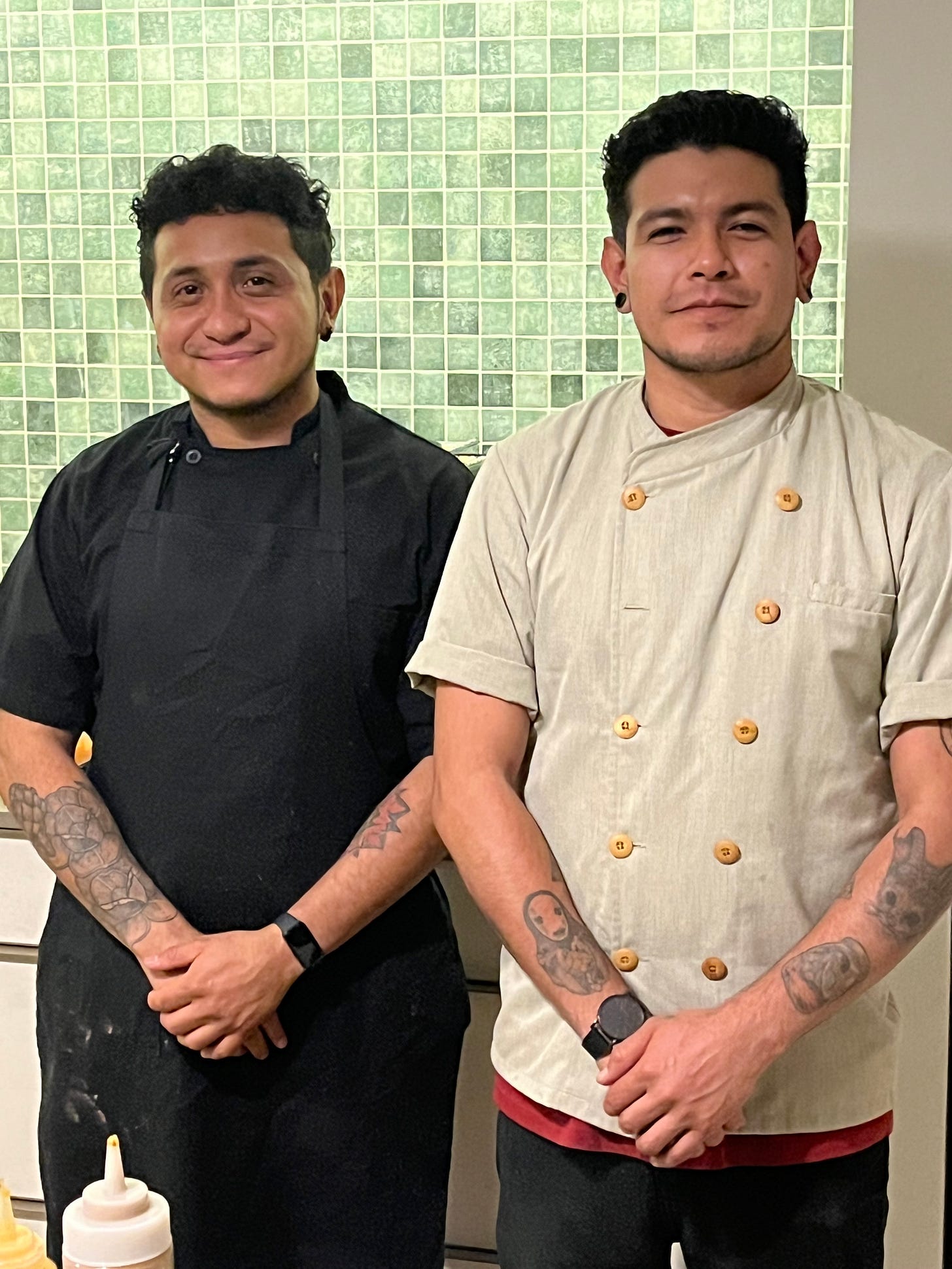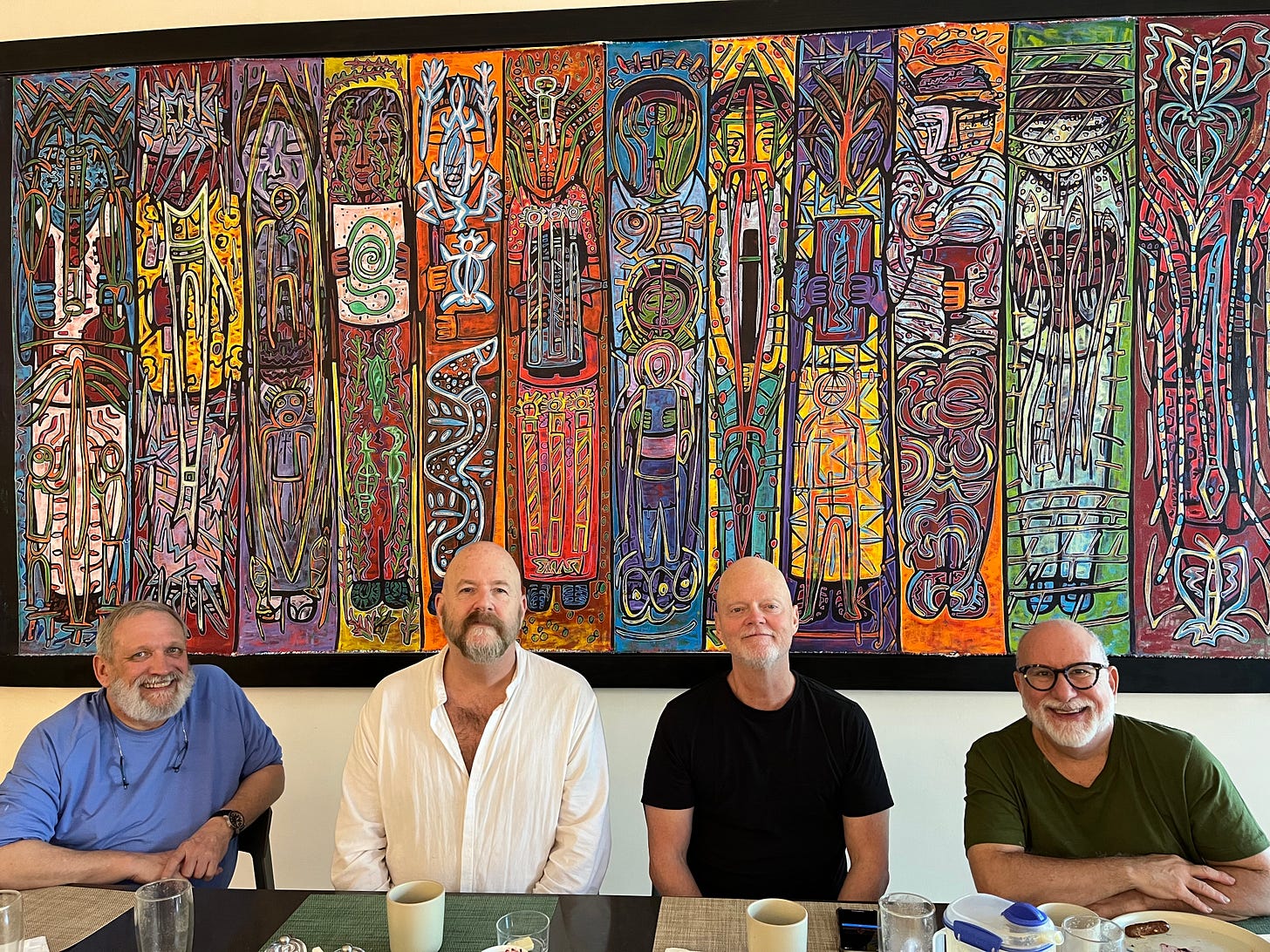For more than ten years, Michael Mele and I have been talking about cooking up a retreat for aging gay men. We contemplated doing it in Italy, where I have conducted numerous gay-male-centered programs for Il Chiostro, the company Michael co-founded with Linda Mironti 25 years ago. Then we thought about doing it in Vieques, where Michael and his husband Andy used to own a beautiful home. This year we finally made it happen in Mérida, the former colonial settlement that is the capital of Mexico’s Yucatán province: “Gay Men and the Art of Aging Gracefully.”
Whether we face the subject with defiance or dread, grief or gratitude, cringing or curiosity, aging happens to all of us, if we’re lucky. What tools have we gathered, individually and collectively, to equip ourselves for the challenge and the opportunity of aging gracefully? The intention of this pilot program for Il Chiostro was to re-write the book on aging as gay men. Our tribe doesn’t necessarily have a lot of role models for navigating this season of life. Some of us have family structures to provide continuity as we age. Others of us rely on peers and partners for support, camaraderie, and a sense of belonging. How do these things change over time? What sustains our capacity for growing in mind, body, and soul? In the lovely atmosphere of a mid-winter getaway to sunny Mérida in Mexico’s Yucatan peninsula, we gathered for a week-long adventure with other soulful gay men, exploring best practices for not only surviving but thriving in our golden years.
Key to the project was finding a venue. We were overjoyed to find El Pueblo, a bed-and-breakfast recently opened by Jeremy Proctor and Cecil Hemingway, an American couple who wanted to create a beautiful and comfortable space welcoming to gay men.
Our group was the first to occupy the whole space. Typical for Il Chiostro, we devised a schedule that combined sessions devoted to the topic of aging gracefully with expeditions and outings introducing participants to the splendors of Mérida, which has drawn increasing attention from American visitors because of its pleasant climate, its distinctive architecture, and its reputation as the safest city in Mexico.
Day 1: Our group came from all over the country and ranged in age from early fifties to late seventies. We began with an opening ceremony acknowledging and blessing the journeys that brought us to this place in life with a ritual of foot-washing and toenail-painting. Our first dinner took place at the Museum of Yucatecan Gastronomy, as good a place as any to sample the specialties of local cuisine: sikil pak, panuchos, salbutes, rellenos negros, poc-chuc, etc.
Day 2: After a delicious and hearty breakfast served by Alfonso and Antonio, El Pueblo’s in-house chefs, we had our first salon, diving into questions about what aging gracefully might look like. Our assumption going into this retreat was that if you’ve gotten to be a gay man in your fifties, sixties, or seventies, you have probably gathered some strategies for surviving and thriving; at the same time, you probably have questions and concerns. Rather than narrowing our inquiry down into some universal standard practice, our intention was to share and gain from multiple perspectives on sex, health, friendship, spirituality, and community. Afternoons were kept loosely scheduled; we had great weather all week but the hot sunny days encouraged hydration and siestas. In the evening we strolled to the Plaza Grande in the heart of Mérida’s historic center and then had dinner at Salon Gallos, a fascinating complex encompassing a restaurant, a wine bar, a lounge, and a cinema.
Day 3: Up early for our first road trip to Uxmal, one of the most remarkable archaeological sites in all of Mexico. Our knowledgeable guide, Fausto, walked us through the grounds, explaining how the pyramid and the administrative buildings reflected Mayan cosmology and cultural life. The ceiba tree’s roots represent the nine realms of the underworld, its branches the 13 realms above. From there we proceeded to Hacienda Mucuyche, where we learned about the industry that created the wealth that made this area one of the richest areas on the continent: the henequen plant, a kind of hemp from which was derived the fiber from which almost all the rope in the world was made (until the invention of nylon took over). This hacienda also includes a very beautiful pair of cenotes, the underground caves peculiar to the Yucatan. We jumped into the open cenote and swam our way along a short canal to an extraordinary closed cenote; then we had lunch at the hacienda’s outdoor cafe. Back at El Pueblo, we conducted our afternoon salon, contemplating the role that travel has played in our lives as aging gay men. For dinner, we walked a few blocks to the house where Michael and his husband Andy were staying, where chef Denis Garido created an unusual and creative Mexican-French fusion meal.
Day 4: Today’s salon focused on “Embracing Your Sexual Journey.” One of our participants, John Caminiti, shared his considerable knowledge about the multitude of options for treating erectile dysfunction and prostate issues. Everybody could relate to this intimate conversation in one way or another. The discussion broadened to sex through the ages — what has changed, what has improved, what we miss. In the afternoon we had a private tour of Montejo 495 Casa y Museo, one of the many grand mansions along Paseo de Montejo, Mérida’s version of the Champs-Élysées in Paris. Maruja Barbanchano gave us a succinct account of how her family acquired the house from the wealthy sisal barons who built the place, and a guide named César walked us through the very ornate public rooms, which had been visited by the likes of Princess Grace of Monaco and Jackie Kennedy. Saturday night the guys got to explore on their own; several of them checked out the fireball game put on every weekend by costumed performers paying homage to a Mayan tradition.
Day 5: After breakfast we had an abbreviated salon, making space to talk about what’s most daunting about aging, which revolved around issues of declining health and managing as a single childless person — who will take care of me? Then we piled into the van for one of the most fun expeditions of the week to Wilson Alonzo’s rural restaurant Ya’axché, outside the small town of Halacho, where we got a cooking class in the form of making from scratch a full traditional Yucateca meal over wood fires.
None of Wilson’s staff spoke English, and none of our guys spoke Spanish, yet somehow we managed to create a banquet of sikil pak, sopa de lima, tamales, kibbeh, tortillas, and pollo pibil — the chicken pieces spiced and wrapped in banana leaves, piled into a clay pot, which is then buried in a charcoal pit and cooked for an hour. I smelled like wood smoke for days but I didn’t mind. We worked with herbs and spices not likely to be found in our kitchens back home: bright red achiote, epazote, pepita (powdered pumpkin seeds), nanche. We got back to El Pueblo just in time to change clothes and walk over to Michael and Andy’s for a cocktail party to meet other gay visitors to Mérida.
Day 6: Monday’s excursion took us to the seaside town of Celestún, renowned in these parts for its mangrove swamp, which is a nature preserve and the breeding grounds for pink flamingoes. At this time of year, it’s possible to see thousands and thousands of those flaming creatures. We also spied spoonbills, herons, ibises, and one sizeable crocodile, whose presence put the kibosh on the prospect of swimming in the designated spring. We had lunch at La Palapa, a casual cafe on the beach, and some people splashed around in the ocean. Back at El Pueblo, we conducted a sweet session of touch exchange, practicing the Wheel of Consent in the process of blessing our aging bodies with nurturing massage.
For dinner, Alfonso and Antonio knocked themselves out with an extremely creative vegan meal celebrating the culture and cuisine of the Yucatán, beginning with a smoking bowl of black rocks referring to the asteroid that landed in the Yucatán 66 million years ago and is responsible for the phenomenon of cenotes. Some of the black rocks turned out to be delicious charred onion rings. The second course was a gazpacho that changed colors when stirred. The main course surrounded grilled cauliflower with a pumpkin sauce garnished with edible flowers, and the dessert buried a small handful of charritos in a birds-nest of sisal.
Day 7: One of our participants, Damon L. Jacobs, is a therapist and sexual health educator who happens to be an expert on PREP, the game-changing medication to prevent HIV transmission, so our morning salon began with his presentation on the subject. We finished up our symposium on aging gracefully by meditating on the value of cultivating our eccentricities. If, as the saying goes, we become the sun-dried tomato version of ourselves as we get older, what quirks are you willing to own and embrace as essential to your character? Our final dinner brought us to Micaela Mar y Lena, recently named Best Restaurant in Mexico by a national culinary society for its creative variations on classic Yucateca dishes.
Michael Mele and I are part of a social circle who started coming to Mérida two years ago for several weeks each winter. When we first visited, Micaela Mar y Lena stood almost alone as a fine-dining establishment on an otherwise dark, rubble-strewn stretch of road. Just since we were here last February, that road — Calle 47 — has been transformed into Corredor Gastronómico, a shiny and bustling Restaurant Row. Not far away is Parque La Plancha, a huge and elaborate urban park that literally did not exist a year ago but has transformed a bleak disused railroad yard into a bustling and well-utilized pedestrian area, art school, and food court. The advent of Tren Mayaa, a rail line conceived to travel across the Yucatan from Cancun to Campeche and beyond, promises to transform the peninsula and increase visitors to Mérida exponentially over the next few years. Let’s hope that turns out to be a good thing for everyone involved. In any case, it turned out to be an auspicious time and place for Il Chiostro to launch its program for “Gay Men and the Art of Aging Gracefully.”




